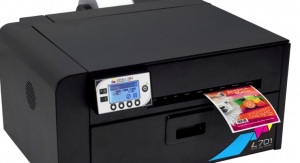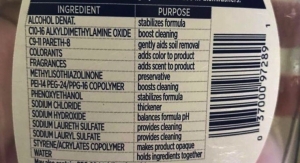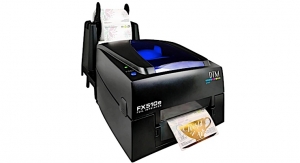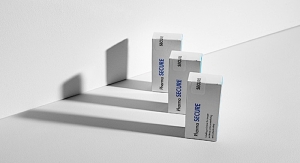Amy White05.09.19
Product labels have many functions – to be eye-catching and attract attention on the shelf is one, but perhaps the most important function is to inform consumers. To not only tell a brand story about a product, but to offer facts that help consumers make a decision about their purchase. And yet in recent years, the data on labels has left many wanting: Almost half (48%) of consumers feel that they do not know enough about a product despite reading the label (source: Label Insight). Consider the Pret a Manger allergy scandal, in which one person died and another is alleged to have died because of allergic reactions to ingredients, leading a coroner to describe the company’s labeling as "inadequate."
How can labeling data be made more robust? The blockchain is a distributed digital ledger which can offer transparency beyond the label, but unlike any other digital database, an entry cannot be changed once it is logged, giving it a high-trust value. "Blockchain is set in stone – which is pretty rare for the internet – it’s also highly secure and fully decentralized," explains Jessi Baker, founder of Provenance, a London-based start-up that uses blockchain technology to offer brands’ traceability in their products.
US-based superstore Walmart and one of Europe’s largest retailers, Carrefour, have adopted blockchain in the last year to trace items from farm to shelf. In one pilot program, Walmart found that by using blockchain, mangos can be traced back to their source farm in 2.2 seconds; without the technology it would have taken six days, 18 hours and 26 minutes to identify the farm. But so far the implementation of this technology has been behind the scenes. A shopper picking up a mango at Walmart still cannot find out much about it from reading its label other than perhaps which country it came from.
But when combined with emerging technologies, a product’s labeling could offer new levels of transparency and therefore empower consumers about their purchasing decisions. "Consumers are starting to demand much more provenance information, particularly in regards to food safety and animal welfare and the expectation is for this to grow," says Drew Lyall, general manager of supply chain specialists arc-net.
In 2018, 75% of consumers said they would be willing to switch brands if another offered them more in-depth product information beyond the label, up from 39% in 2016. And a majority (69%) of consumers want retailers to be more transparent about their sustainability efforts (sources: Label Insight/Food Marketing Institute/Hartman Group).
In the US, Bumble Bee Foods, a major producer of canned seafood, has launched a collaboration with software company SAP using its Cloud Platform Blockchain to trace yellowfin tuna from the Indonesian ocean to the can. With a quick scan of a QR code, customers can discover where the fish was caught, the weight of the catch and whether it has been certified as sustainable.
"The label supports the consumer’s need to know and reinforces their faith in the brands they trust" says Oliver Betz, general manager of SAP Innovative Business Solutions.
In the alcohol industry, counterfeiting has become a global problem with companies in the EU losing €2.7bn (£2.3bn, $3bn) in sales every year due to fraudulent wines and spirits, and the World Health Organization (WHO) reports that unrecorded alcohol accounts for 25% of worldwide alcohol consumption. But smarter packaging could assure customers that what they are sipping is the real deal. Concerned with the rise of counterfeit whisky, Adelphi, the parent company of Ardnamurchan Distillery in Scotland, has partnered with Edinburgh-based arc-net to launch a blockchain-verified single malt. The limited-edition bottle has a QR code on its neck, so buyers can verify its authenticity.
The challenge for designers will be how to inventively integrate QR codes into packaging in ways that are not obtrusive and to encourage customer engagement. Beer brand Downstream chose to make its QR code an integral part of its aesthetic. Created by Ireland Craft Beers in collaboration with arc-net in late 2017, it claims to be the world’s first blockchain beer. Each can has a large QR code creating an easy way for customers to glean more information about their specific beer. Similarly, Bock Chain, a new blockchain beer made in Alberta, Canada, has a pixelated label with all the squares coming together to form a QR code in the middle. Scanning it opens up a microsite that contains not only timestamps of the beer’s journey, but videos and other content to build a story around the data.
But blockchain-enabled labels are useless unless people want to scan the code in the first place. Almond, an app that aims to educate and incentivise sustainable behaviour, launched its first blockchain-verified product, FACT sparkling water, in November 2018 in collaboration with EVRYTHNG. The QR code, hidden under the can’s ring pull, offers access to the Almond app, which contains full traceability about the product and its carbon footprint and also unlocks cash rewards, allowing users to collect Almond Coins that can be used on other sustainable purchases. The subtle placement of the QR code ensures it is only used by someone purchasing the product, and the reward element acts to encourage future purchases and engagement.
These products are just the beginning of what a label will be able to do in the future. Global management firm Accenture envisions a world where, with the simple scanning of a label, consumers will be able to connect with small-scale producers directly. Its Circular Supply Chain project uses blockchain and unique digital identifiers on product labels which let consumers find out about producers (a coffee farmer for example) and, if they wish, send them a tip via their smartphone. The next challenge will be how to develop technologies that offer customer interaction without a specific trigger. As Richard Meszaros of Accenture reminds us: "Today’s consumers demand enhanced transparency about the products they purchase. They don’t care how this is done, only that it is done and that it is simple, easy and fast to verify with no added steps."
Blockchain-enabled products offer designers a chance to create engaging, immersive packaging that encourages customers to delve beyond the label and into a brand new world of transparency. Whether that be through "QR codes, augmented reality, embedded NFC or something entirely different, who can really say," muses Lyall. But he believes one thing is clear: "More products will have calls to action." And the design is up for the imagining.
How can labeling data be made more robust? The blockchain is a distributed digital ledger which can offer transparency beyond the label, but unlike any other digital database, an entry cannot be changed once it is logged, giving it a high-trust value. "Blockchain is set in stone – which is pretty rare for the internet – it’s also highly secure and fully decentralized," explains Jessi Baker, founder of Provenance, a London-based start-up that uses blockchain technology to offer brands’ traceability in their products.
US-based superstore Walmart and one of Europe’s largest retailers, Carrefour, have adopted blockchain in the last year to trace items from farm to shelf. In one pilot program, Walmart found that by using blockchain, mangos can be traced back to their source farm in 2.2 seconds; without the technology it would have taken six days, 18 hours and 26 minutes to identify the farm. But so far the implementation of this technology has been behind the scenes. A shopper picking up a mango at Walmart still cannot find out much about it from reading its label other than perhaps which country it came from.
But when combined with emerging technologies, a product’s labeling could offer new levels of transparency and therefore empower consumers about their purchasing decisions. "Consumers are starting to demand much more provenance information, particularly in regards to food safety and animal welfare and the expectation is for this to grow," says Drew Lyall, general manager of supply chain specialists arc-net.
In 2018, 75% of consumers said they would be willing to switch brands if another offered them more in-depth product information beyond the label, up from 39% in 2016. And a majority (69%) of consumers want retailers to be more transparent about their sustainability efforts (sources: Label Insight/Food Marketing Institute/Hartman Group).
In the US, Bumble Bee Foods, a major producer of canned seafood, has launched a collaboration with software company SAP using its Cloud Platform Blockchain to trace yellowfin tuna from the Indonesian ocean to the can. With a quick scan of a QR code, customers can discover where the fish was caught, the weight of the catch and whether it has been certified as sustainable.
"The label supports the consumer’s need to know and reinforces their faith in the brands they trust" says Oliver Betz, general manager of SAP Innovative Business Solutions.
In the alcohol industry, counterfeiting has become a global problem with companies in the EU losing €2.7bn (£2.3bn, $3bn) in sales every year due to fraudulent wines and spirits, and the World Health Organization (WHO) reports that unrecorded alcohol accounts for 25% of worldwide alcohol consumption. But smarter packaging could assure customers that what they are sipping is the real deal. Concerned with the rise of counterfeit whisky, Adelphi, the parent company of Ardnamurchan Distillery in Scotland, has partnered with Edinburgh-based arc-net to launch a blockchain-verified single malt. The limited-edition bottle has a QR code on its neck, so buyers can verify its authenticity.
The challenge for designers will be how to inventively integrate QR codes into packaging in ways that are not obtrusive and to encourage customer engagement. Beer brand Downstream chose to make its QR code an integral part of its aesthetic. Created by Ireland Craft Beers in collaboration with arc-net in late 2017, it claims to be the world’s first blockchain beer. Each can has a large QR code creating an easy way for customers to glean more information about their specific beer. Similarly, Bock Chain, a new blockchain beer made in Alberta, Canada, has a pixelated label with all the squares coming together to form a QR code in the middle. Scanning it opens up a microsite that contains not only timestamps of the beer’s journey, but videos and other content to build a story around the data.
But blockchain-enabled labels are useless unless people want to scan the code in the first place. Almond, an app that aims to educate and incentivise sustainable behaviour, launched its first blockchain-verified product, FACT sparkling water, in November 2018 in collaboration with EVRYTHNG. The QR code, hidden under the can’s ring pull, offers access to the Almond app, which contains full traceability about the product and its carbon footprint and also unlocks cash rewards, allowing users to collect Almond Coins that can be used on other sustainable purchases. The subtle placement of the QR code ensures it is only used by someone purchasing the product, and the reward element acts to encourage future purchases and engagement.
These products are just the beginning of what a label will be able to do in the future. Global management firm Accenture envisions a world where, with the simple scanning of a label, consumers will be able to connect with small-scale producers directly. Its Circular Supply Chain project uses blockchain and unique digital identifiers on product labels which let consumers find out about producers (a coffee farmer for example) and, if they wish, send them a tip via their smartphone. The next challenge will be how to develop technologies that offer customer interaction without a specific trigger. As Richard Meszaros of Accenture reminds us: "Today’s consumers demand enhanced transparency about the products they purchase. They don’t care how this is done, only that it is done and that it is simple, easy and fast to verify with no added steps."
Blockchain-enabled products offer designers a chance to create engaging, immersive packaging that encourages customers to delve beyond the label and into a brand new world of transparency. Whether that be through "QR codes, augmented reality, embedded NFC or something entirely different, who can really say," muses Lyall. But he believes one thing is clear: "More products will have calls to action." And the design is up for the imagining.





















